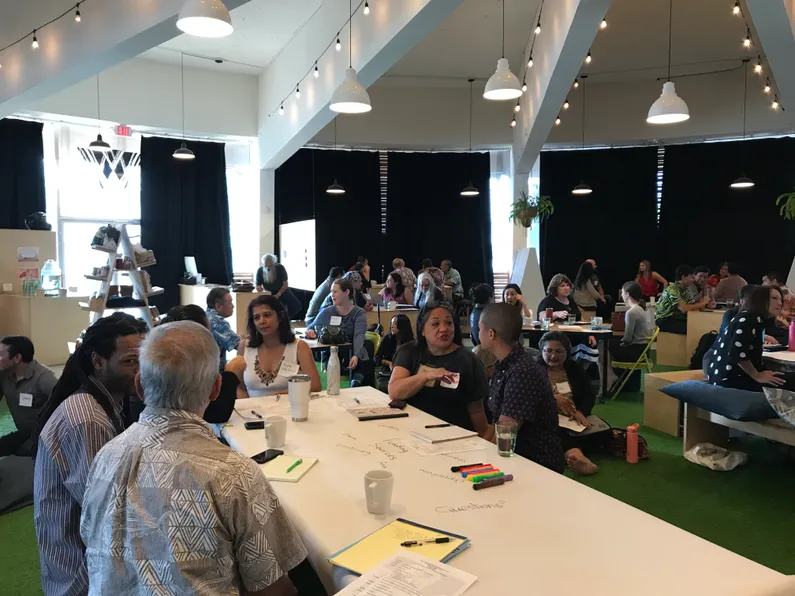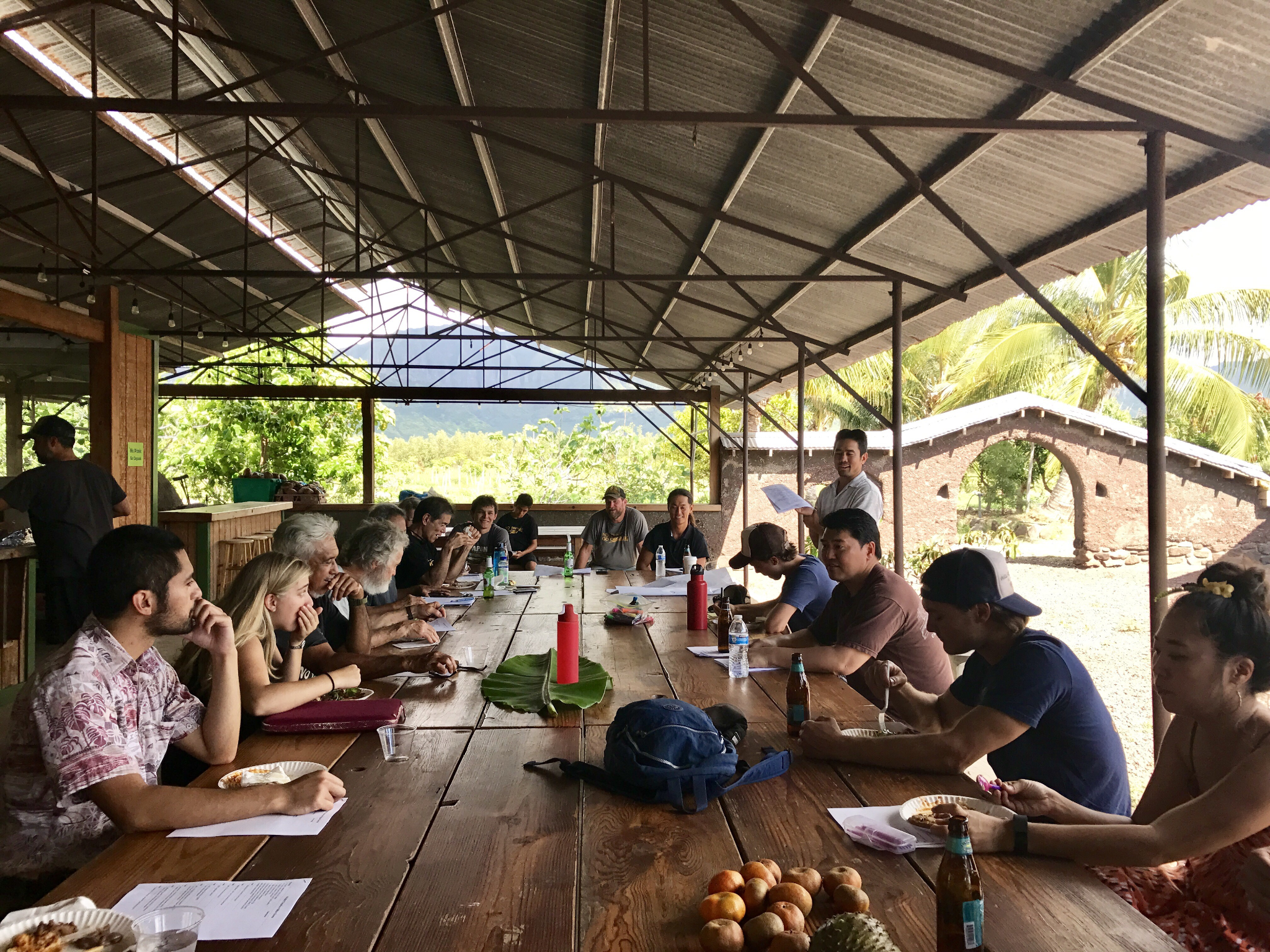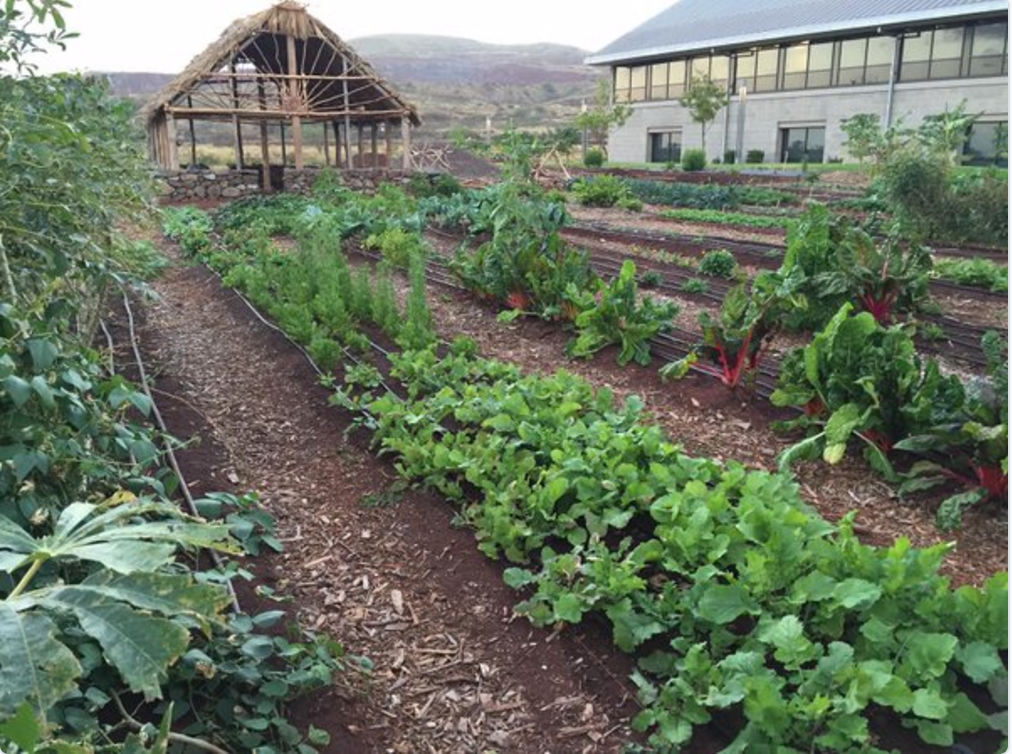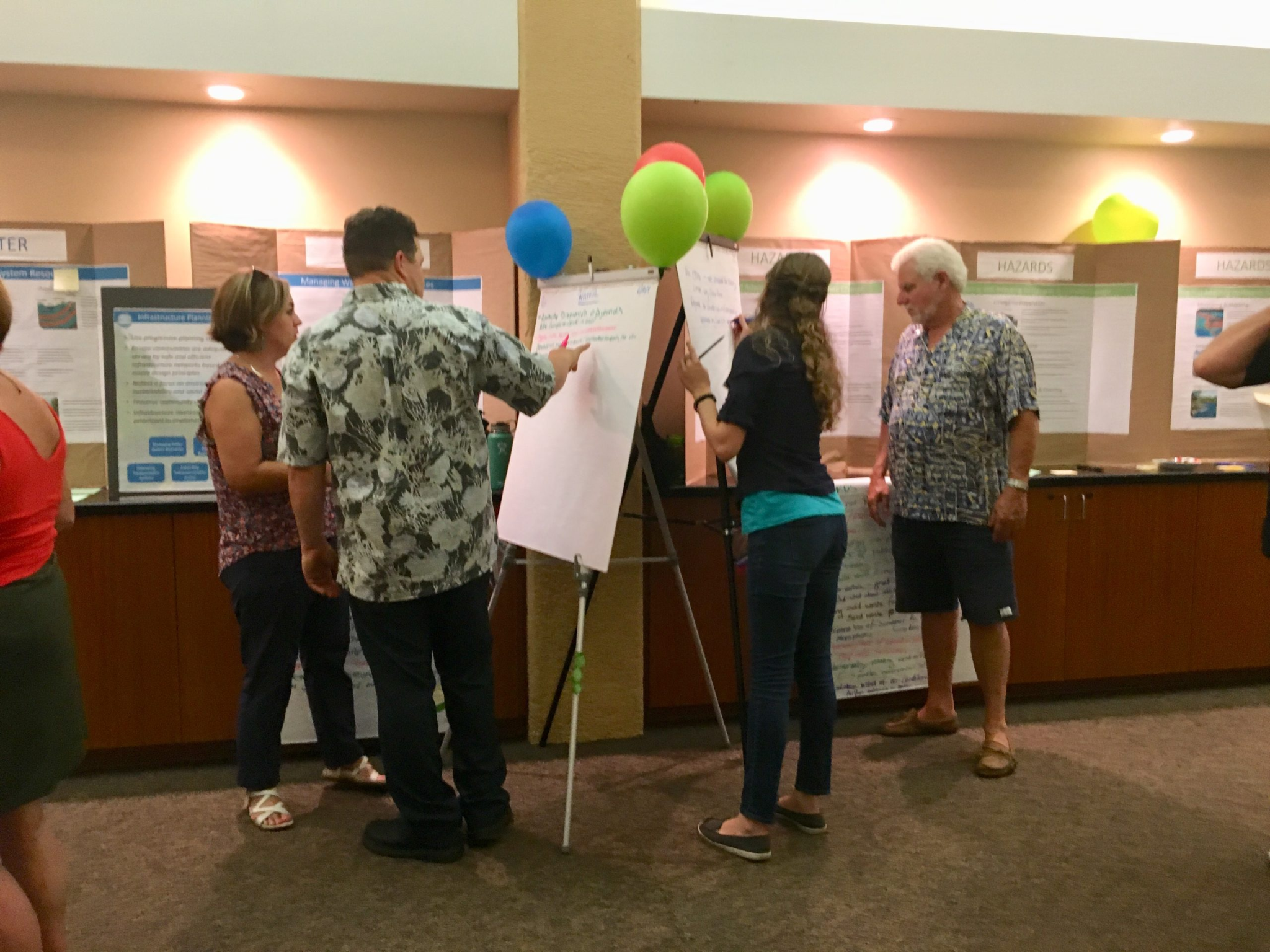In 2017, the HACBED team convened close partners and supporters to celebrate HACBED’s 25th Anniversary as well as listen to feedback on areas of need for our community and institutional partners. The following themes that emerged or were affirmed included:
- Transition is a dangerous period. It works best when values are passed on — shared values help to guide the vision.
- HACBED’s core competency is holding space — spaces for tough conversations.
- We exist to serve this place and those who choose to be of this place.
- Community Based Economic Development (CBED) in Hawaiʻi is our kākoʻo economic development. Every family has kākoʻo of caring for fish in an area — they would go there and feed the fish. Our kuleana is to feed the fish first, before they feed us — this is CBED.
- Finding people among us who can make bridges is just as important as the CBED vision. We have to be strategic about how to identify people in the power structure.
- We also collectively committed to bucketing our work into the following areas:
In 2022, the HACBED team reconvened close partners for HACBED’s 30th Anniversary, which was particularly momentous as we were all reemerging from the COVID-19 pandemic.
Leading up to HACBED’s anniversary, the team observed the following lessons learned over the past five years:
- Connection and interrelation between our work related to Intergenerational Knowledge Evolution and ‘Āina & Food Justice as ‘āina-based work sees a generational shift.
- Virtual gatherings increased access in some ways and created new challenges as tied to process design considerations & facilitation techniques given the change in the way folks connect online and the increased distractions as well as decreased attention spans.
- Increased importance of mental & emotional health awareness and self-care, which is also partially related to the new remote work world and impacts of virtual gatherings.
- Potential area for attention is related to Community Driven Institutional Support given the increasing capacity of community-based organizations and the need to support institutions to build their capacities to engage with communities.
The team also used some of 2020 and 2021 to reconnect with our Founders to see what they were observing. This subsequently led to themes to frame the 30th Anniversary:
- Kākou — all of us, including non-humans
- Climate Change — physical & social impacts
- Steady State / No Growth
- Cultural Wellness
- Reimagining Tourism — commitment to place; mutual learning about stories of places & people
- Support for Community Organizing — meeting facilitation & mediation skills
The HACBED team distilled Founder, board, and team feedback to the following statement for the 30th Anniversary: “Coming together with a mindset of kākou, including all living creatures to rethink how we as a community can organize to reimagine our economy towards a vision of cultural wellness as we face climate change in both physical and social embodiments.”
The HACBED team built on the 3 buckets out of the 25th Anniversary towards clusters to get feedback and guidance from our founders, partners and friends in World Cafe style talk story sessions:
- ʻĀina, Community Control of Land, and Food Security — need to conserve land, flora, and fauna first and the subsequent difficulties tied to land issues in Hawai‘i and the need to build community capacity.
- Impacts of COVID to Revisit our Economy, Tourism, and Place-Based Workforce Development — COVID highlighted the importance of local food systems, the opportunity to be innovative, and the need to develop sustainable and mutually beneficial tourism practices.
- Moving Education Systems Towards Spaces of Healing — the challenges of integrating cultural and place-based learning in western education models and cultural differences and power dynamics in university settings.
- Reengaging Spaces of Power — being mindful of where power lies and who gets a seat at the table as well as acknowledging that there is power in people coming together.
Intergenerational Knowledge Evolution
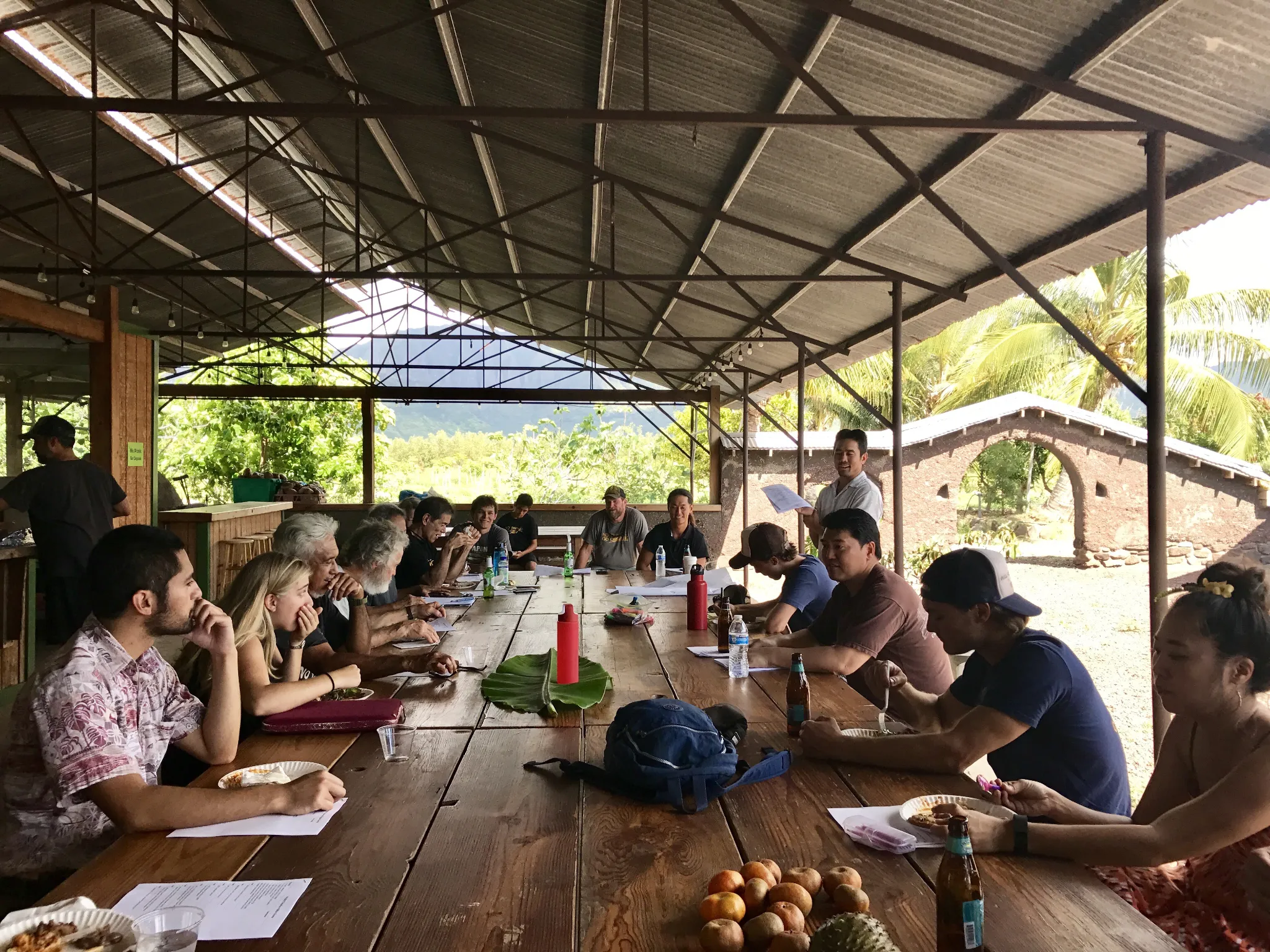
Collaborating with partners who are supporting leaders from different generations to transition into new roles as tied to their organizations and communities. This work includes:
- Kula No Na Po‘e Hawai‘i & Papakōlea Community Development Corporation Strategic Planning — HACBED has provided Kula No Nā Po‘e Hawai‘i (KULA) and Papakōlea Community Development Corporation (PCDC) with strategic planning support services. HACBED staff members interviewed key stakeholders, through a variety of channels to collect feedback and stories to supplement the work completed to date with a focus on identifying potential strategic relationships for KULA and PCDC.
- Partners In Development Foundation — In 2022, HACBED supported Partners in Development Foundation’s (PIDF) Strategic Plan implementation. The leadership and program management teams convened and collaborated to solidify existing strategic plan goals and outcomes, create detailed action steps to measure progress, and identify staff roles necessary in order to move towards achieving identified outcomes by the end of PIDF’s three-year target period.
‘Āina & Food Justice
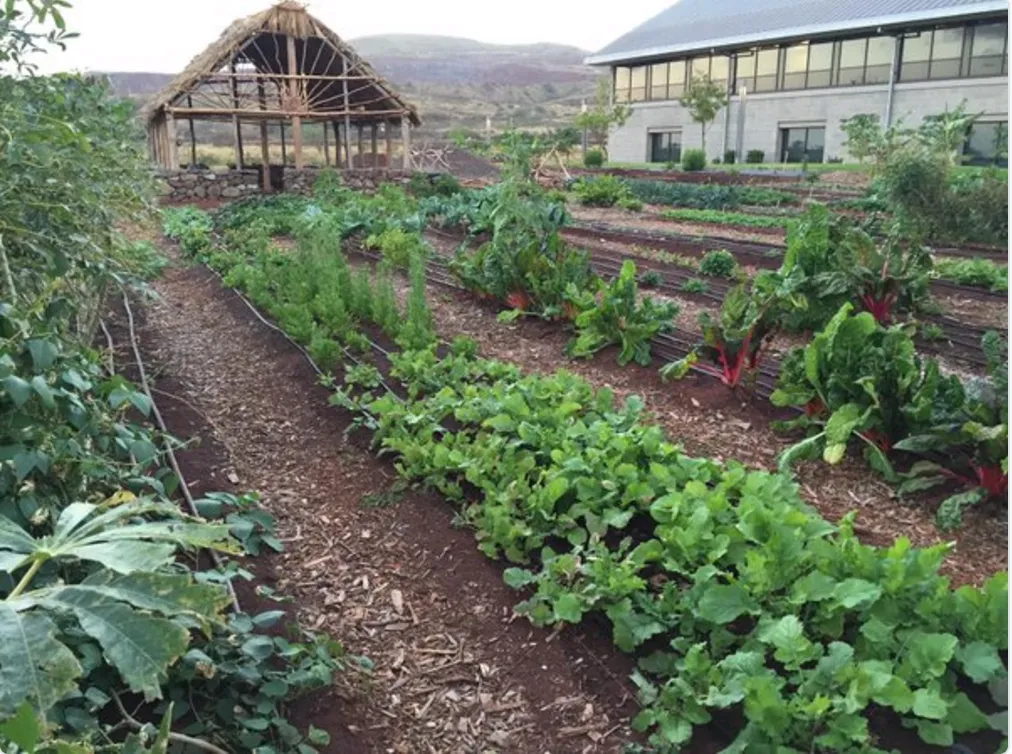
Reaffirming our connection to our roots in support of ‘āina, that which feeds us, and ‘āina-based organizations that steward those places to drive our work as tied to food system and justice issues. This work includes:
-
Aloha Harvest — 2020 was an unprecedented year in which pandemic conditions exacerbated existing food insecurity for Hawaiʻi families. HACBED was contracted by Aloha Harvest, an Oʻahu-based food rescue organization, to perform a study on the potential development of a Food Hub. As part of the Food Hub study, HACBED supported Aloha Harvest through evaluations of the current market for food rescue, identifying potential facilities for acquisition and performing financial projections, assisting with facilitation and documentation of feedback from focus groups, and engaging relevant stakeholders and partners to conceptualize synergistic and cross-sectoral pathways for expansion.
-
SNAP Inquiry — HACBED was contracted by the Department of Human Services (DHS) to train and provide technical assistance to Supplemental Nutrition Assistance Program (SNAP) staff, SNAP participants, and SNAP Nutrition Education (SNAP-ed) Providers using the “Appreciative Inquiry” approach to connect personal stories to the target population.
-
Youth Food Sovereignty Congress — In June of 2018, MAʻO Organic Farms engaged HACBED to plan a convening of youth voices on the topic of food sovereignty among indigenous populations. HACBED worked alongside four of MAʻO’s Hoʻōwaiawai Youth Leadership Training (HYLT) interns to plan and organize the Hoʻōla ʻĀina Youth Food Sovereignty Congress (YFSC).
-
Kīpuka Lāna‘i Farms (KLF): Lima Huli Project Lānaʻi — HACBED partnered with KLF for the Lima Huli Project Lānaʻi which aimed to foster economic, cultural, and environmental well-being among Lānaʻi residents in an ʻāina-based, skills-focused, educational context. HACBED worked to support KLF’s efforts to support the Lānaʻi community and steward the historic ahupuaʻa of Pālāwai.
-
MAʻO Māʻona — HACBED was contracted by MAʻO Organic Farms to support their Administration for Native Americans (ANA) grant project by providing planning and facilitation support for their Māʻona project, specifically the ‘Auwai Consortium and Employer Hui Focus Group Convenings, including:
- Support staff in building capacity and convening the prospective Employer Hui.
- Facilitate engagement and pilina of prospective employers to co-design a mechanism to communicate on-farm skills acquisition.
- Support staff in building capacity and convene, engage, and strengthen youth, ʻohana, and social networks.
- Facilitate youth and ʻohana experiences to strengthen pilina and to inform continuous refinement of project activities.
Community-Driven Institutional Support
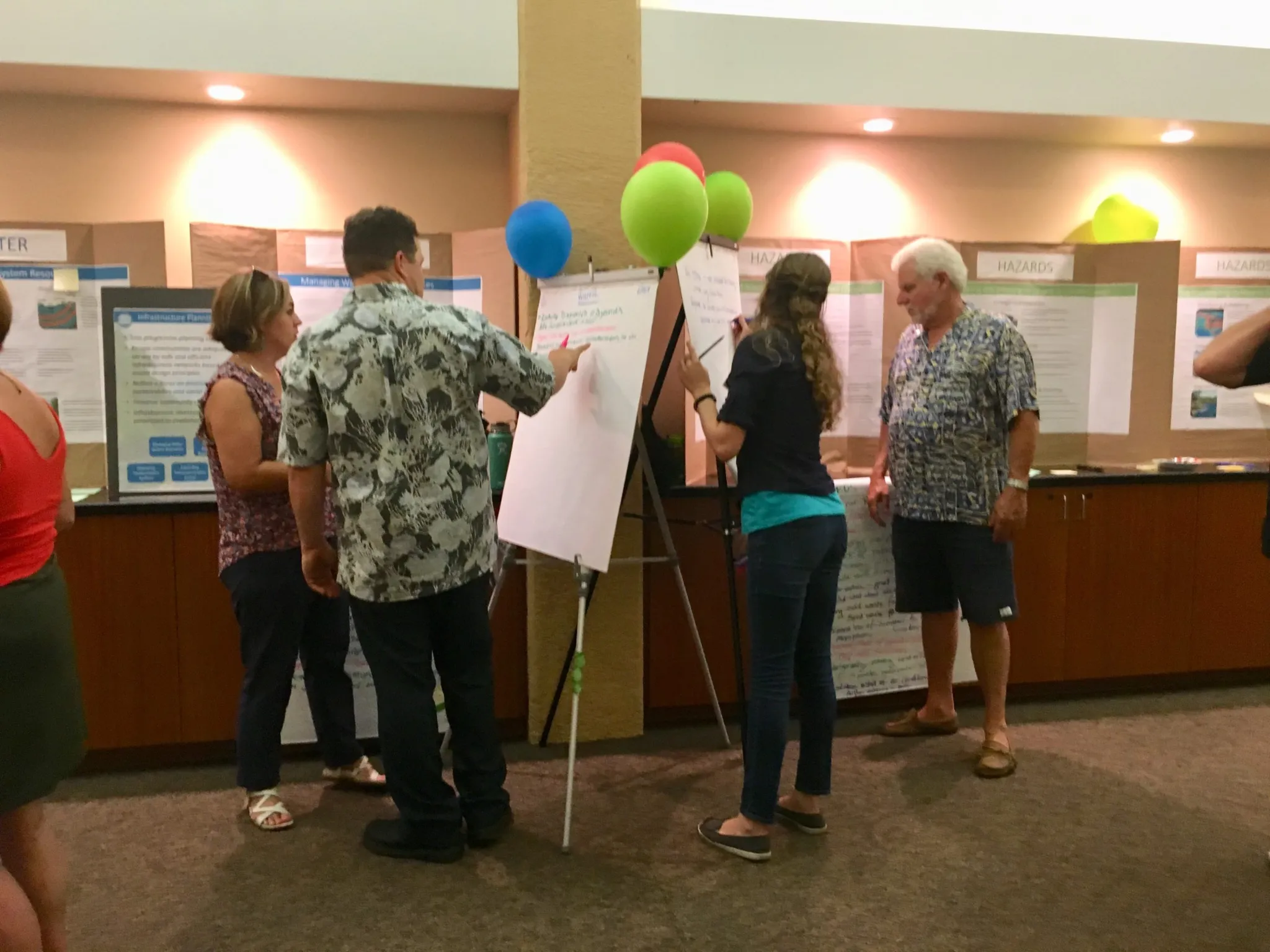
Working with individuals connected with institutions who are committed to this place and supporting their efforts to push these systems to be more community driven and community accountable. This work includes:
-
Affordable Hawaiʻi for All (AHA) Fellows — HACBED provided convening, facilitation, recording, synthesis, and follow-up support to the AHA Fellows and the supporting organizations. The Affordable Hawaiʻi for All (AHA) Fellows consisted of emerging leaders who come from diverse backgrounds and who each have lived-experience in communities that struggle to find or sustain housing. The Support Team included Hawaiian Community Assets, Hawaiʻi Appleseed, James Koshiba and Cathy Kawano-Ching, and HACBED. The main goal of the support team was to uplift AHA Fellows’ project ideas to address housing affordability issues in their communities as informed by their experiences.
-
Coastal Biocultural Restoration as a Nexus for Innovation Workshop — HACBED provided facilitation support to Purple Maiʻa Foundation for its National Science Foundation (NSF) Convergence Accelerator project: Coastal Biocultural Restoration as a Nexus for Innovation Workshop, which was hosted virtually from May 13, 2021 through May 17, 2021. Engaging 314 participants from 6 countries and 10 U.S. states, the workshop convened a diverse group representing different sectors of society, including Indigenous Peoples / Native Hawaiians, scientists, businesses/corporations, government officials, tribal leaders, university leaders, cultural practitioners and community-based nonprofit leaders to develop project ideas and define priorities for use-inspired research and application centered around the process and practice of coastal biocultural restoration. As part of its workshop support, HACBED assisted with the planning and lead facilitation of Aho (Track) 1 – Coastal Biocultural Restoration for Resilience: Food & Flooding and Aho 3: Sustainable Development and Coastal Biocultural Restoration. In addition to the actual workshop facilitation, the scope of work included assistance to the planning team in designing the workshop to effectively identify priorities for high-impact applications of biocultural restoration, sharing of successful models, and strengthening of network connections, along with workshops debriefs, and report support focused on review and feedback. The workshop was the third step in the Convergence Accelerator Program Model’s Ideation Process and the final report will assist NSF in selecting future track topic(s). Selected tracks will move into the Convergence Research Focus phase and will be released in a program solicitation with selected awards focusing on the acceleration of basic research into practice and the leveraging of multidisciplinary approach / partnerships with funding of up to $750K for a 9 months planning phase and funding of up to $5M for the subsequent 24 months solutions development phase.
-
Hawaiʻi County Office of Housing and Community Development — HACBED collaborated with the County of Hawaiʻi’s Office of Housing and Community Development (OHCD) to design and implement a financial empowerment strategy using the Cities for Financial Empowerment’s (CFE) Financial Empowerment Center (FEC) model of free, professional, and one-on-one financial counseling and coaching. HACBED support to Hawaiʻi County OHCD and FEC counseling partners include:
- Co-facilitation of FEC counseling partner management meetings and County to meet CFE requirements
- Identifying and determining ongoing needs and effectiveness of the FEC and related services
- Co-facilitation of monthly meetings with community partners to outreach FEC services, avoid duplication of services, and build partnerships for long-term FEC sustainability
- Documenting and tracking support to meet and ensure CFE requirements are met
-
Puna Community Resilience & Capacity Building Support — A collaboration between the County of Hawaiʻi, HACBED, and other community partners to build community resilience in areas such as emergency food security, disaster preparedness, and family homelessness. The project focused on strengthening connections and growing partnerships between communities and community organizations through capacity building support and community resilience and asset mapping workshops.
-
DHHL Waiʻanae and Nānākuli Regional Plan Updates — HACBED provided support to the Department of Hawaiian Home Lands (DHHL) in its 10-month process of updating the Wai‘anae and Lualualei Regional Plan and the Regional Plan for the Traditional Native Lands of the Ahupua‘a of Nānākuli. HACBED, in partnership with DHHL, updated, analyzed, and summarized data in the regions; conducted stakeholder interviews and focus groups in the regions; conducted community meetings within the regions; and provided an updated regional plan for each of the two regions.
-
Maui Affordable Housing Plan Community Shareback — In support of Hawaiian Community Assets’ (HCA) contract with the Office of Council Services on November 9, 2020, HACBED supported the HCA team in carrying out four shareback meetings in April 2021 that helped to inform the published Maui County’s Comprehensive Affordable Housing Plan. HACBED provided planning, coordination, and documentation support during the four virtual share back meetings. These share back meetings encouraged several community members to call their representatives, volunteer to be affordable housing advocates, and offer their professional skills in support of this plan.
-
Hawaiʻi Island Tourism Strategic Plan — HACBED supported Hawai‘i County Department of Research & Development to update the 2006-2016 Hawai‘i Island Tourism Strategic Plan to include current local and global trends looking towards 2020-2025. HACBED worked with the County on background research on local and global trends, stakeholder engagement with individuals and groups from the community, the visitor industry, cultural practitioners, and others, as well as network gatherings to engage the broader community. The published 2020-2025 Hawaiʻi Island Tourism Strategic Plan can be found here.
-
Pōhue Bay — HACBED supported the Trust for Public Land (TPL) and National Park Service (NPS) in preparation of the transfer of a 16,451-acre parcel of Pōhue Bay to Hawaiʻi Volcanoes National Park through the convening of various stakeholders to guide its management, protection, and preservation of the parcel. HACBED convened community engagement listening sessions surrounding updates tied to Pōhue Bay and the current process for NPS to manage the land and collected community feedback, concerns, and suggestions that focused around stewardship of and access to the area. HACBED gathered community feedback and concerns from key stakeholders, including residents near the Pōhue Bay property, Native Hawaiians individuals with historical connections to the land, Native Hawaiian organizations, and other Hawaiʻi Island stewardship organizations
-
Native Hawaiian Women Development Initiative and Empowering Hawaiʻi Island Businesses — HACBED supported the Hawaiʻi County Research and Development Team with the Native Hawaiian Women’s Development Initiative which aimed to support economic equity of Native Hawaiian women while promoting sustainable and regenerative practices in Hawaiʻi. The project focused on empowering Native Hawaiian women entrepreneurs, fostering economic diversification, and addressing social and environmental challenges by providing financial resources, business training, mentorship, and community support, to create an inclusive ecosystem that promotes the economic well-being of Native Hawaiian women and their communities.
General Capacity Building
The HACBED team continues to provide general capacity building support in line with its roots. This work includes:
- INPEACE ‘Ike Hawai‘i Indigenous Pop-Up Science Center Feasibility Analysis — HACBED partnered with the Institute for Native Pacific Education and Culture (INPEACE), a nonprofit organization that offers “Hawaiian culture-based early learning education and promotes community strengthening through educational equity, teacher development, and family economic capacity-building programs” to conduct a feasibility study for an ‘Ike Hawai‘i Indigenous Pop-Up Science Center.
- KUA Strategic Business Plan Support — HACBED partnered with Kua‘āina Ulu ‘Auamo (KUA), “a backbone organization that supports grassroots growing through shared responsibility.” HACBED was asked to support a strategic planning-like process combined with additional financial training and organizational assessment.
- Epic ʻOhana — HACBED staff members met with members from all of EPIC ʻOhana’s programs as well as various Child Welfare Services units including those in Honolulu, Kapolei, Kona, and Hilo to collect their feedback on EPIC ʻOhana services and produce a five-year strategic plan.
- Vibrant Hawai‘i — Vibrant Hawaiʻi Island is a collective impact community movement that brings people together to achieve social, educational, and economic wellness. HACBED served Vibrant Hawaiʻi by providing fiscal support, process design, facilitation, and documentation.

